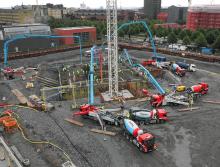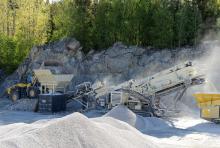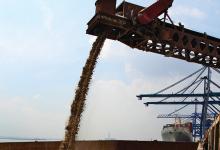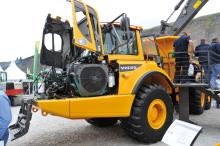The Nordic aggregates sector has exhibited dynamic growth in the last two decades, which is reflected in the numerous large-scale investment projects implemented in the industry in recent years. However, the onset of COVID-19 in 2020 has led to industry stagnation as a result of a significant drop in demand from major local aggregates-consuming industries.
Denmark is among the countries facing these consequences. Jakob Kløve Keiding, head of the Danish Centre for Minerals and Materials (MiMa) and a leading aggregates sector expert in the Nordic region, says that the pandemic has had a negative effect on the aggregate sector in general, but adds that its final outcome has yet to be assessed.
Speaking exclusively to Aggregates Business Europe, Kløve Keiding commented: “The need for aggregates is closely linked to the construction industry which has been hit by corona particularly in the first months of the pandemic, and this will be reflected in a reduced need for aggregates for buildings and perhaps also for some infrastructure projects. Overall, it is therefore expected to see a general reduction in Danish aggregates production, which is mostly for the building sector including housing. I expect to see a similar trend to what we are experiencing in Denmark in other Nordic states.”
The Danish aggregates sector had shown a good performance prior to the pandemic.
According to data from MiMa, Danish aggregates production over the past 20 years has been around 30-50 million m3/year (equivalent to 48-80 million tonnes a year). Most of the aggregates are sourced from sand and gravel pits (75% of total production). In addition, 8-10 million m3/year (12.8-16 million tonnes a year) of aggregates are dredged in the seas around Denmark.
The high aggregates production seen prior to the 2008 financial crisis has still not returned. However, aggregates production has increased since 2010 and demand is expected to rise over the next 15 years, despite the impact of the coronavirus. Denmark is largely self-sufficient in aggregates, but imports about 4.3 million tonnes of crushed solid rock annually and exports approximately 2.0 million tonnes per year, mainly marine-dredged aggregates.
The current situation for the aggregates sector of the Nordic region’s largest country, Sweden, is more favourable than in Denmark.
This is confirmed by leading local analysts in the field, including Mårten Sohlman, CEO of the Swedish aggregates association SBMI (Sveriges Bergmaterialindustri), who commented: “Most Swedish companies in the construction sector have not noticed any direct coronavirus effects on the business so far. The parts that most people see are clearly affected are environmental permit processes. They usually go sluggishly in normal cases, but it is now clearly slower than usual. Many negotiations were suspended during spring 2020, and there is a backlog. This backlog will have a clear effect on the industry in the longer perspective.”
According to SBMI analysts: “Some construction projects are postponed to the future, while at the moment there are fewer on the drawing board. The industry will feel this in 2021.”
Sohlman says that, despite the fact that Sweden opted to avoid the actual closing down of society, the pandemic has had a negative effect on infrastructure construction, and some of these consequences will be experienced in the longer term. He added that there is still a great need for infrastructure construction in Sweden in the longer term, and because of this the SBMI expects a recovery of the domestic aggregates market in the short term.
In the meantime, analysts of Sveriges geologiska undersökning (SGU), the Geological Survey of Sweden, also expect the aggregates sector to recover in the short term.
Mattias Göransson, a senior state geologist at SGU, said the 2020 figure for aggregates production in Sweden will be quite close to the 100 million tonnes total in 2019.
“This is mainly due to some major road building projects whose implementation in the country is currently ongoing,” said Göransson. “As in other European countries there have been some minor delays in Sweden, partly because of a lack of special equipment and difficulties for foreign workers in entering Sweden during the spring-summer period. Many companies have tried to work from home as much as possible. When it comes to housing construction, which is mainly concrete aggregates, we still have no estimation of production for this year. Concrete constitutes only 12% of aggregates in Sweden, which means that a small decrease in housing won’t affect total aggregate production very much.”
Göransson said that some quarry owners and contractors are worried that future construction contracts may be delayed.
As well as completely new infrastructure projects, he added that there will also be renovation of older and major housing projects. “Together these activities can stimulate aggregates production and we do not estimate Sweden will have a reduction to below 100 million tonnes a year in the coming years,” Göransson said.
SGU analysts say that the current level of business activities in the Swedish aggregates sector remains generally high, which is reflected in the total amount of licences, and the continuation of old quarries as well as new ones, with the numbers being comparable to those in recent years.
An SGU spokesman said: “Some new sites have been applied for, especially in areas close to Stockholm where major infrastructure activities and housing construction is being carried out. A driving force for new applications is the environmental challenge to decrease extraction from gravel pits. The alternative to sand and gravel is crushed rocks from hard-rock quarries, but Swedish quarries are not all suitable for concrete stone production.”
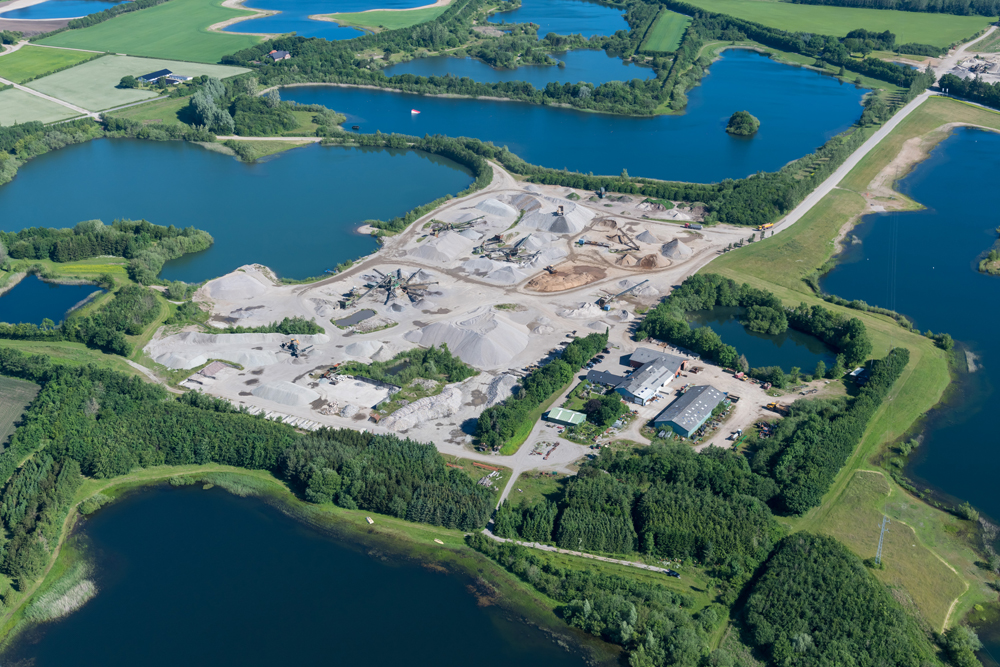
Dirk Fincke, secretary general of European aggregates association UEPG, also believes that the current situation in the Nordic aggregates sector remains stable: “Sweden did not have a proper shut-down with almost no impact on operations in 2020. Equally, the negative impact on production is minor in Denmark, Finland and Norway.
“However, there might be a second Corona wave and it is not yet clear if people will be able to afford housing or governments are having the financial capacity to invest in broader infrastructure projects. It is also not clear as to what scale we are achieving to increase current renovation rates.”
Fincke says that one of the side effects of the corona crisis on Sweden and its aggregates industry is the slow progress of environmental permits, with a backlog impacting on companies now and in the future. In addition, some construction projects were postponed and fewer are on the drawing board.
UEPG analysts told Aggregates Business Europe that the current demand for aggregates in Nordic countries is only slightly lower than in 2019 and comparable to previous years.
On a positive note, public roads and construction could be an area that is invested in in the future to compensate for the downturn in other areas of the economy, as occurred during the financial crisis.
Many local producers remain optimistic about the future prospects of the aggregates sector. Bjarne Overgaard, head of Bedsted Lø Grusværker, a Denmark-based aggregates producer, commented: “COVID-19 has had no effect on the sale of aggregates. However, we expect a slight decline in Q1 2021. We have had a large demand for aggregates, and expect it to continue, albeit with a slight decline in Q1. The architects have again got new projects, so we only expect the decline to be in the first quarter.”
Kari Aslaksen Aasly, team leader natural construction materials at the Geological Survey of Norway (NGU) – the national institution for the study of bedrock, mineral resources, surficial deposits and groundwater – said that, as with many other sectors, the construction and aggregates industries in the country have been affected by the pandemic.
Aasly cited the recently published report by the Norwegian directorate for mining, which found that the country’s aggregates industry sold 98 million tonnes of aggregates in 2019, an increase of 5% from 2018. In addition, 28 million tonnes of aggregates were exported, mainly to the European market.
Aasly commented: “Despite the pandemic, and with the increase in population and plans for new roads and railway, there is no reason to believe that the increasing trend will change over the next years.”
Local analysts state that Norway is expected to be one of the prominent players in the region’s aggregates sector in years to come. Jakob Kløve Keiding comments: “The production of aggregates in the Nordic countries is largely driven by Norway because of the considerable export of crushed rock. About 28 million tonnes – 30% of the total annual crushed rock production in Norway – is exported.”
Thomas Concrete Group expands with acquisition
Sweden-based Thomas Concrete Group is expanding in Europe by acquiring Sollebrunns Betongelement. As a result of the acquisition, the company will also become the largest shareholder (35.48%) in the Polish company Scanbet, which develops and produces pre-casted concrete.
“This is an important deal that enhances our offering within precast products. It is another step in our long-term strategy to continue to develop and strengthen our position as a group,” says Hans Karlander, CEO and president of Thomas Concrete Group.
The agreement for the acquisition of Sollebrunns Betongelement was signed on Tuesday, 8 December. The change of ownership is scheduled for 1 March 2021. At that point Sollebrunns Betongelement will become a wholly owned subsidiary of Thomas Concrete Group. The acquired company already holds 35.48% of the stock in Scanbet, which, thanks to the agreement, will pass to Thomas Concrete Group.
“We have been impressed by the employees of Sollebrunns Betongelement and by the quality of their products. We now intend to continue to grow and develop the business in Sollebrunn,” says Karlander.
Sollebrunns Betongelement was founded in 1996 and is a complete framework supplier that each year manufactures approximately 10,000 concrete elements. The company has 80 employees in Sweden and has an annual turnover of approximately SEK 200 million (€19.56mn).
“We feel reassured with Thomas Concrete Group as our new owner. For us it was important to sell to a partner who wants to develop the business in Sollebrunn in the long term. They also want to revitalize and improve the concrete industry, which we regard as a very positive approach,” says Lennart Pehrsson, chairman of the board of Sollebrunns Betongelement.


